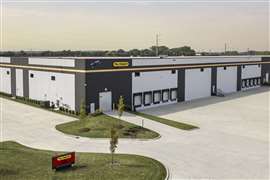Cadman cuts CO2 with HVO
03 August 2021
 Cadman Cranes in the UK has taken delivery of its fourth unit of Liebherr’s 60 tonne capacity LTM 1060-3.1 wheeled mobile crane. In addition to its ability to run on HVO fuel it has ECOmode and ECOdrive functions which can cut fuel consumption by up to 10 per cent
Cadman Cranes in the UK has taken delivery of its fourth unit of Liebherr’s 60 tonne capacity LTM 1060-3.1 wheeled mobile crane. In addition to its ability to run on HVO fuel it has ECOmode and ECOdrive functions which can cut fuel consumption by up to 10 per cent
Crane rental specialist Cadman Cranes in the UK has made a major commitment to reducing its carbon footprint by using HVO fuel.
Hydrotreated vegetable oil (HVO) is a second-generation biofuel primarily made from renewable materials, primarily used cooking oil and animal fats from food industry waste. It has a chemical structure almost identical to regular fossil diesel and can be used as a “drop-in” substitute, cutting emissions by up to 90 per cent. For more on HVO fuel and related developments look out for the August issue of International Cranes and Specialized Transport magazine.
Cadman calculated that over a 12-month period it produces 645 tonnes of carbon dioxide (CO2), 519 tonnes of which is solely from the use of red diesel in the mobile crane fleet. It says it will immediately switch 50 per cent of its fleet over to HVO fuel and plans to have switched the other half over by the end of 2021.
Matt Waddingham, Cadman Cranes managing director, said, “We are a mobile crane company, and we can’t avoid taking these big vehicles on the road. But we can do it in the most responsible way possible by investing in the huge advances in green technology that exist right now. The introduction of HVO to 50 per cent of our crane fleet will mean an immediate reduction in CO2 of 230 tonnes a year and our planned move to 100 per cent HVO will see our carbon footprint drop by 72 per cent overall. This is on top of greatly improved air quality caused by a substantial reduction in nitrogen oxides and particulate matter. The benefits of a switch to HVO are undeniable and for Cadman Cranes it is a vital first step on our journey to net zero carbon.”
Cadman’s fleet includes wheeled mobile telescopic cranes from up to 180 tonnes capacity, mini cranes, compact crawlers, truck mounted units from Böcker, lorry loaders and specialist lifting equipment.
STAY CONNECTED


Receive the information you need when you need it through our world-leading magazines, newsletters and daily briefings.
CONNECT WITH THE TEAM












